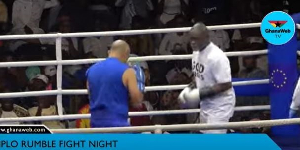- Home - News
- TWI News | TV
- Polls
- Year In Review
- News Archive
- Crime & Punishment
- Politics
- Regional
- Editorial
- Health
- Ghanaians Abroad
- Tabloid
- Africa
- Religion
- Election 2020
- Coronavirus
- News Videos | TV
- Photo Archives
- News Headlines
- Press Release
General News of Monday, 3 February 2003
Source: gna
World Bank to reinvest in smallholder agriculture
Dr. Francis Ofori, Director of Crop Services of the Ministry of Food and Agriculture (MOFA), at the weekend said the World Bank, was considering reinvesting in smallholder agriculture in the country.
Speaking at the inauguration of the Rubber Out-growers and Agents Association (ROAA) and the commissioning of its head office at Agona Nkwanta,
Dr. Ofori said the World Bank was deciding to support the sector towards the boosting of rubber, oil palm and other tree crop production, particularly in the savannah areas of the country.
The Director of Crop Services, who was also Chairman of the Steering Committee of the Rubber Out-growers Plantation Project (ROPP), said MOFA had been charged to identify areas for immediate assistance.
He said the Western Region, which was leading in tree crop production in the country, would receive the bulk of the assistance.
Dr. Ofori said the formation of ROAA was a component of the second phase of the rubber out-growers' plantation project being financed by the Agence Francaise developpenent (AFD), the French Development Aid agency.
He said the impressive performance of the Ghana Rubber Estate Limited (GREL) in the development or rubber in the region, led to the launching of the first rubber out-growers project in 1995.
Dr. Ofori said the project was financed by government, AFD and the World Bank at a cost of about 1.5 million Euros under GREL's management.
He said under the first phase, 1,400 farmers were assisted to plant 1,200 hectares of rubber and 41 kilometres of road and other forms of infrastructure were provided.
Dr. Ofori said government entered into another agreement with AFD for a credit facility of 5.9 million Euro for the second phase of the project, under which another 200,800 hectares of rubber would be cultivated to benefit 500 families over a five-year period.
He said at the end of the second phase, 4000 hectares of rubber would be planted for 900 families.
At maturity, 6000 tonnes of exportable rubber valued at 3.5 billion US dollars were expected yearly from the 4, 000 hectares of the out-grower rubber project and an additional 40 kilometres of road would be rehabilitated.
Dr. Ofori urged ROAA to register as a farm-based organisation to enable it benefit from the services of MOFA, under the Agricultural Services Sub-sector Investment Programme (AGSSIP).
He said under AGSSIP, farm based organisations would be considered as promising bodies that could accelerate agricultural growth and development.
Mr John Asmah, Chairman of the Forestry Commission, said rubber trees and bamboos could be used as substitutes for timber.
Mr. Asmah said Dupaul Wood Treatment Limited in Takoradi and BMK Limited in the Ahanta West District, has started using rubber trees for producing furniture.
He said the association has a crucial role to play in protecting the country's forest resources, which were being destroyed through greed and indiscipline.
Mr Patrick Tarente, Managing Director of GREL, said the company would soon start monitoring the progress of the rubber out-growers project.
He assured the association of the company's continued support and training of its members to boost productivity.
Nana Asaa Kofi III, Chief of Kyekyewere and Chairman of the association, said the building of the association's head office cost about 300million cedis.
He said the Michelin Group; the main buyer of natural rubber in Ghana contributed towards the formation and inauguration of the association.
Nana Kofi III appealed to the Agricultural Development Bank to pay the farm maintenance fee regularly to the out growers.
Kasapreko Kwame Pafanyni III, President of the Western Regional House presided.










